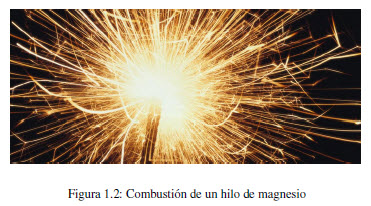 In any physical or chemical process there is no change in the amount of matter. For a chemical reaction, the sum of the masses of the reactants must equal the sum of the masses of the products.
In any physical or chemical process there is no change in the amount of matter. For a chemical reaction, the sum of the masses of the reactants must equal the sum of the masses of the products.Consider the combustion of metallic magnesium. Magnesium burns with oxygen in the air to form magnesium oxide. The magnesium oxide formed has a greater mass than magnesium metal. The difference in mass coincides with the mass of oxygen used in the combustion.
Keep in mind that a nuclear reaction does not obey the law of conservation of matter, since there is a significant conversion of matter into energy.



